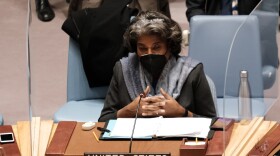
Michele Kelemen
Michele Kelemen has been with NPR for two decades, starting as NPR's Moscow bureau chief and now covering the State Department and Washington's diplomatic corps. Her reports can be heard on all NPR News programs, including Morning Edition and All Things Considered.
As Diplomatic Correspondent, Kelemen has traveled with Secretaries of State from Colin Powell to Mike Pompeo and everyone in between. She reports on the Trump administration's "America First" foreign policy and before that the Obama and Bush administration's diplomatic agendas. She was part of the NPR team that won the 2007 Alfred I. DuPont-Columbia University Award for coverage of the war in Iraq.
As NPR's Moscow bureau chief, Kelemen chronicled the end of the Yeltsin era and Vladimir Putin's consolidation of power. She recounted the terrible toll of the latest war in Chechnya, while also reporting on a lighter side of Russia, with stories about modern day Russian literature and sports.
Kelemen came to NPR in September 1998, after eight years working for the Voice of America. There, she learned the ropes as a news writer, newscaster and show host.
Michele earned her Bachelor's degree from the University of Pennsylvania and a Master's degree from the Johns Hopkins University School of Advanced International Studies in Russian and East European Affairs and International Economics.
-
FBI and State Department officials gave reporters an update on some of what the U.S. has learned so far about the balloon.
-
The Iranian American businessman's hunger strike marks seven years after he was left out of a prisoner swap when the Iran nuclear deal took effect. He's appealing to President Biden for action.
-
Diplomats from the group of 7 are discussing winter aid for Ukraine.
-
The U.S. and Mexico proposed to the United Nations Security Council a "non-U.N." force for Haiti to help the country resolve deepening crises, but countries are cautious given prior harmful efforts.
-
Thursday's announcement of new U.S. sanctions follows pressure from activists for the U.S. to support the protests, following the death of Mahsa Amini in custody of Iran's so-called morality police.
-
As leaders gather for the first all-in-person General Assembly since the pandemic, the war in Ukraine is a major focus. Secretary-General António Guterres has warned this is a time of "great peril."
-
The U.S. now believes Ukraine can win, a significant change in thinking, and is rushing in weapons. This raises the risk of widening the conflict, analysts say, and may destabilize the global economy.
-
Signaling renewed support for Ukraine, the U.S. says it will slowly return diplomats back to the Ukrainian capital. It also promised new military aid for the besieged country.
-
At Monday's U.N. Security Council meeting, the U.S. hoped to get an explanation from Russia of exactly what it was doing regarding Ukraine. But instead, the meeting was full of tense exchanges.
-
The U.S and Russian deputy foreign ministers kick off a week of talks, hoping to ease tensions over Ukraine, which Russia is threatening with a troop build-up near their shared border.








